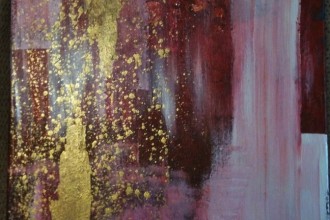I’m not sure there has ever been a time when humans loved silence. This is not to deny that we have a knack for evading certain words and certain speakers. It is simply to say that, east of Eden, we’ve always been ill at ease with ourselves and so with one another. Without noise, we are forced to see what is absent.
We just so happen to live in a time when the world is louder than it’s ever been. It has become easier to hide from silence and so from ourselves and, consequently, from one another. We muffle silence at our own peril. And the terrible hum continues to crescendo with its dehumanizing effect. In an attempt to save the world or at least one small corner of it, I decided to write a poem. And what else should I do? “The most unfailing herald, companion, and follower of the awakening of a great people to work a beneficial change in opinion or institution, is poetry.” [1]
This poem was born in my temporary cell in the monastery of the Society of Saint John the Evangelist in Harvard Square in Cambridge, Massachusetts. The product of my annual silent retreat taken every June, these words took shape largely inspired by two provocative passages written by Dietrich Bonhoeffer and Søren Kierkegaard. I’ve provided them here in order to frame the poem a bit, so that my words are not spoken into a vacuum (where they are sure to die). I hope their words might also serve as dialogue partners with my own.
“Let him who cannot be alone beware of community. Let him who is not in community beware of being alone.” [2]
“The present state of the world and the whole of life is diseased. If I were a doctor and were asked for my advice, I should reply: ‘Create silence’. Bring men to silence. The Word of God cannot be heard in the noisy world of today. And even if it were blazoned forth with all the panoply of noise so that it could be heard in the midst of all the other noises, then it would no longer be the Word of God. Therefore, create silence.” [3]
Perhaps it seems a bit backwards to attempt to create silence by generating more words. That may be so. But, as Roger Scruton points out, there is a difference between preventing silence and letting silence speak. He illustrates his point with music. He writes: “music in the listening culture is a voice that arises out of silence, and which uses silence as a painter uses the canvas: silence is the prima materia from which the work is composed, and the most eloquent parts of the classical sonata movement are often the parts when nothing can be heard, when, for however brief a moment, we hear through the music to the silence behind…”[4]
The silence which we need and should cherish is the fullness of space between words. This poem, I suppose, is an invitation to dwell there for a bit. Without further chatter, here is the poem, such as it is.
Some, not comfortable with them-
selves– together
Fill the silence.
Disquieted coughs.
The dance of aimless feet, shuffling.
Glances down, faces aglow.
(Better a brother far, than a neighbor near)
Away. And in this way
Silence is averted, drowned.
The breeze, the still small voice, shot.
Let there be –
(I say:
We must learn to speak not,
Progress to the ancient critical period, acquiring)
Silence.
This –
The tongue of the wise
(not fools).
Silence: the ancient, learned art of reticence
(but not for this unreal).
Silence: the actual, the unsaid exchange,
The dialogue of those united not by words but by a word –
The Word –
spoken over them –
Who speaks over them:
Their name:
Beloved, all, comfortable with them-
selves together
Filled by silence.
[1] Percy Bysshe Shelley, “A Defence of Poetry” in English Essays of The Harvard Classics, ed. Charles W. Elliot (New York: P.F. Collier, 1968), 359.
[2] Dietrich Bonhoeffer, Life Together (New York: Harper & Row, 1954), 78.
[3] Søren Kierkegaard, For Self-Examination/Judge for Yourselves. This particular version of the quote is found in Max Picard, The World of Silence, trans. Stanley Godman (Chicago: Henry Regnery, 1977), 251. A less colloquial version can be found in Kierkeegard FSE, trans. Howard V. Hong (Princeton: Princeton University Press, 47).
[4] Roger Scruton, The Soul of the World (Princeton: Princeton University Press, 2014), 153.





